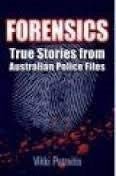A fingerprint identifies a serial poisoner, a strange indentation in a caravan panel proves a hit-run driver’s guilt, and a mass DNA screening flushes out a brutal criminal. Vikki Petraitis has interviewed Australian police from Forensics, Fingerprints, Criminal Investigation Units and Homicide to write these stranger-than-fiction true-crime stories. They include: ‘Poison Ivy’, the Melbourne woman so dubbed because of her habit of drugging and robbing lonely, vulnerable men. Police taking part in the lengthy investigation had the added pressure of believing it was only a matter of time before one of her victims died as a result of her tactics. — The De Gruchy case, in which three members of a family were found brutally murdered in their home outside Wollongong. Forensic evidence alone proved the identity of the killer. — Death at Violet Town, a fatal collision in which a hit-run driver killed a 12-year-old boy at Easter. Meticulous forensic detection – and a stroke of luck – resulted in a conviction after a tense six-month hunt. — In all these cases, forensics played a key role in bringing the perpetrators to justice. But unlike many fictional TV forensics shows, the resolution of these real-life detective stories relied as much on the dogged determination of the police involved as on modern technology. pp. 255 illusts #0120D/0221
Forensics: True Stories from Australian Police Files
$10.00
Sold Out
Additional Information
| Author | Vikki Petraitis |
|---|---|
| Publisher | The File Mile Press |
| Year Published | 2006 |
| Binding Type | Softcover |
|---|
